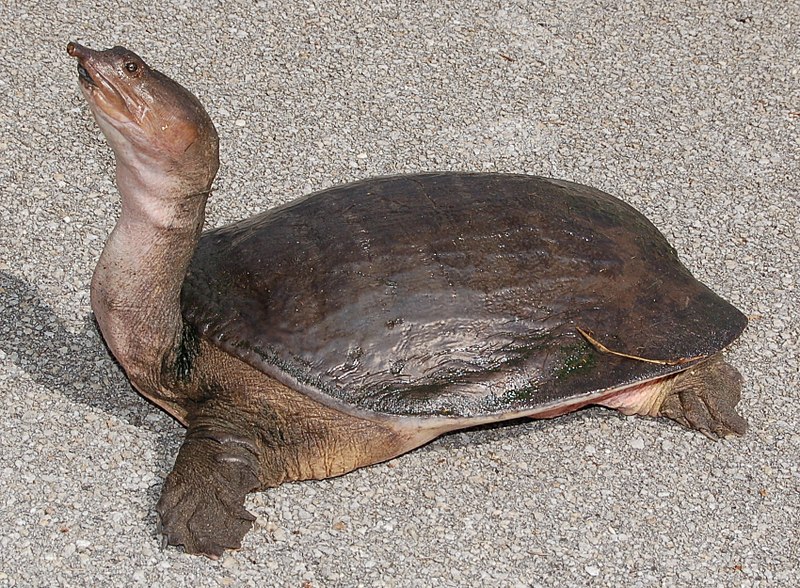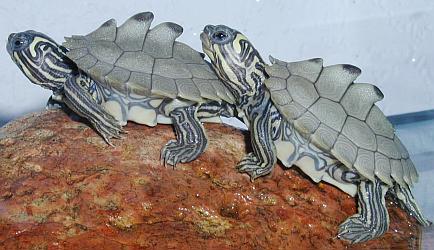Most turtles become quite responsive to their owners (especially near feeding time!), and a great many show impressive abilities to learn and adjust to new situations. In my experience, however, few approach the wood turtle (Glyptemys insculpta, formerly Clemmys,) in these areas.
Testing Turtles
 Herpetologists and experienced turtle enthusiasts consider the wood turtle to be among the most intelligent of the turtles – in lab tests, they consistently scoring higher than other species on maze and reward-association tests. In my experience, captives exhibit a degree of curiosity and problem-solving abilities not evident in other turtles.
Herpetologists and experienced turtle enthusiasts consider the wood turtle to be among the most intelligent of the turtles – in lab tests, they consistently scoring higher than other species on maze and reward-association tests. In my experience, captives exhibit a degree of curiosity and problem-solving abilities not evident in other turtles.
“Thinking” before Acting?
While all turtles soon come to associate their owners with food, wood turtles rarely rush about “begging” each time one approaches their enclosure, as do other species. Instead, they most often look intently at their benefactor – deciding, it seems, if it would be “worthwhile to beg”. A group I worked with would always regard me carefully as I passed, but only scrambled for position if I carried their food trays.
These turtles were housed in a 6-foot-long cattle trough, tilted on one end to form a pool. When I drained the enclosure, they invariably gathered near the drain to snatch leftover food carried there. Turtles that missed a morsel of food would peer down the drain for some time, often changing angles to get a better view. Again, they seemed to “consider” the situation – not wasting effort trying to retrieve a food item that was unreachable.
Turtles Tricking Earthworms
Earthworms, a favorite food, are lured to the surface by stomping the front feet and the plastron against the ground. It is believed that earthworms interpret the vibrations as rain, or that the vibrations stress the worms and force them upward – hammering a piece of wood into the ground often has the same result. This is the only turtle known to employ such a technique.
While this behavior may be instinctive and does not necessarily indicate intelligence, one has to wonder why other turtles do not do so. It would be interesting to discover if all wood turtles do this, or if a degree of learning is indeed involved.
I’ll cover wood turtle care in the future. Please write in with your questions and comments. Thanks, until next time, Frank Indiviglio.
Further Reading
An interesting field report on how habitat development affect wood turtles is posted at http://www.woodturtle.com/Saumure%20and%20Bider%201998.pdf.
To read more about reptile intelligence, please see my article Learning: Observations of Zoo Animals (Lizards).
 That Reptile Blog – Reptile, Amphibian and Exotic Pet Care and Information
That Reptile Blog – Reptile, Amphibian and Exotic Pet Care and Information

 website. More important (infinitely more!) than my connection to NYTTS is their long standing relationship with legendary turtle biologist Peter Pritchard, who often speaks at the group’s day-long annual seminars. Rhom Whittaker, Mike Klemens, Roger Wood, Indraneil Das and numerous other notables have also participated in NYTTS sponsored programs.
website. More important (infinitely more!) than my connection to NYTTS is their long standing relationship with legendary turtle biologist Peter Pritchard, who often speaks at the group’s day-long annual seminars. Rhom Whittaker, Mike Klemens, Roger Wood, Indraneil Das and numerous other notables have also participated in NYTTS sponsored programs. conservation and natural history. Noted author and herpetologist Andy Highfield directs the organization, which is utilized by professionals and hobbyists alike.
conservation and natural history. Noted author and herpetologist Andy Highfield directs the organization, which is utilized by professionals and hobbyists alike. number of ways to participate in such. In addition to dozens of informative articles, one may also find photographs and even recordings of tortoise vocalizations on this most useful web site.
number of ways to participate in such. In addition to dozens of informative articles, one may also find photographs and even recordings of tortoise vocalizations on this most useful web site. Please see
Please see 
 Although considered only mildly toxic, S. jendeki’s venom is quite complex, containing at least 19 different proteins. Scientists believe that these molecules may be useful in synthesizing new drugs. Newly discovered molecules, which may attack cells in novel ways, are always looked upon with great interest by medical researchers working with incurable diseases and drug-resistant microbes.
Although considered only mildly toxic, S. jendeki’s venom is quite complex, containing at least 19 different proteins. Scientists believe that these molecules may be useful in synthesizing new drugs. Newly discovered molecules, which may attack cells in novel ways, are always looked upon with great interest by medical researchers working with incurable diseases and drug-resistant microbes.